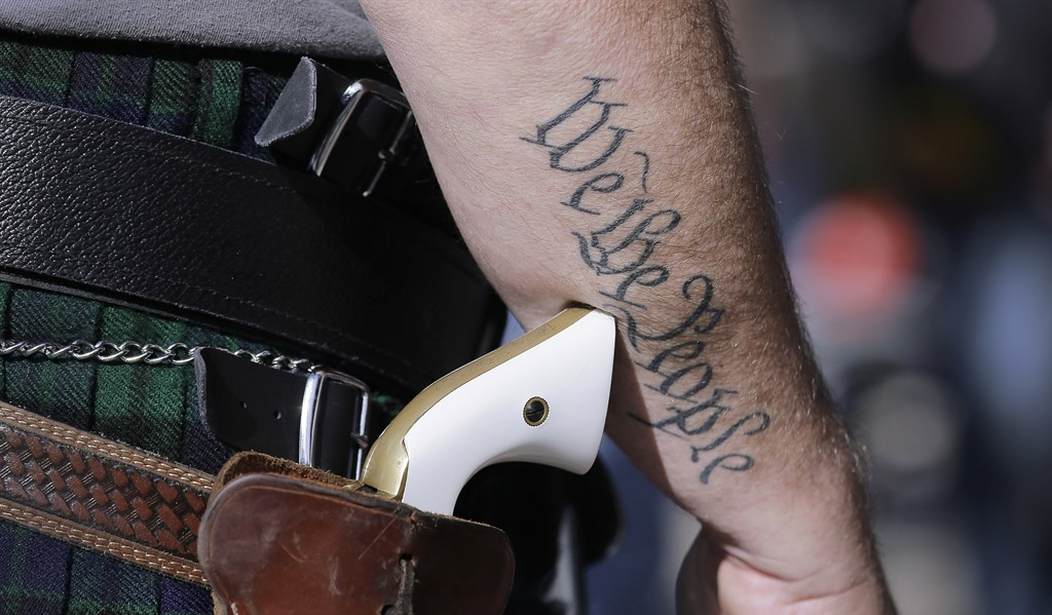For awhile, I was under the impression that the never-Trumpers who ran The Bulwark still saw themselves as conservatives, albeit ones who felt alienated by the dominance of the pro-Trump sentiments within the Republican Party. It’s clear by now, however, that the ethos behind The Bulwark is to adopt standard Democrat talking points while gussying them up with a patina of non-partisanship. I don’t know if anybody’s buying it, especially when there’s virtually no daylight between the positions of The Bulwark and, say, gun control sugar daddy Michael Bloomberg.
Given the scale of the problem and the widespread interest in reform, you would think that gun violence would be a major, ongoing issue before state legislatures, in local governments, and at the ballot box. Instead, five or more unelected justices on the U.S. Supreme Court are positioned to ban meaningful gun regulation altogether if they personally see fit to stretch the Constitution that far in a landmark Second Amendment case on the docket this term—a reality made more troubling by some personal judicial lines already drawn around the issue.
I actually had to go back and check the byline once I read that. Was it Shannon Watts posting a guest editorial? David Chipman (who, now that I think about it, would probably be a huge hit with the Bulwark staff)? Nope. This particular hot take comes from Kimberly Whele, the author of “How to Read the Constitution.. and Why“. Apparently Whele’s version of the Constitution is missing that part about the right of the people to keep and bear arms not being infringed, because she’s all in favor of keeping the average citizen from lawfully carrying a firearm in self-defense.
New York State Rifle & Pistol Association v. Buren, scheduled for oral argument next month, is the biggest Second Amendment case since the 2008 landmark decision in District of Columbia v. Heller, in which Justice Antonin Scalia penned a majority opinion that effectively trumped the Court’s ruling in United States v. Miller. That case held in 1939 that the Second Amendment protects state militias. In Heller, the Court declared for the first time that the Second Amendment actually protects an individual’s right to own a handgun in the home for self-protection.
Uh, no. The Miller case did not establish that the Second Amendment protected state militias. The opinion in Miller stated that arms that were of no utility in the service of a militia were not protected by the Second Amendment. The question of whether or not the Second Amendment protected an individual right to keep and bear arms was never the issue, nor was it substantively addressed in the Court’s opinion.
Meanwhile, just this week the Court turned down a case challenging a Wisconsin law banning residents with felony convictions from owning handguns for the rest of their lives, even if for nonviolent crimes (a prior case involved a man who sold pirated cassette tapes in the 1980s, for example). The lower court’s rationale was that the state’s interest in preventing gun violence was paramount. That’s precisely the question facing the Court this term: Does a state have an interest in protecting human life and safety that justifies limiting individuals’ ability to carry concealed firearms in public?
The answer would seem obvious, particularly given the Court’s apparent tolerance of lifetime bans on gun ownership for nonviolent felons. There are plenty of dangerous gun owners out there without felony convictions. Isn’t the state justified in protecting people from those folks too?
Is the state justified in preventing the average citizen from exercising their right to keep and bear arms because there’s a possibility that they might do something dangerous?
Hell no it’s not. That’s like saying the state is justified in stopping and searching random people on the street because we know that a small percentage of the public might be carrying something illegal, or preventing people from peaceably assembling because sometimes when crowds gather it can turn into a riot.
In fact, the Supreme Court already addressed this asinine argument in Heller, after the District of Columbia argued that its ban on handguns was reasonable given that handguns are the type of firearm most often used in crime.
It is no answer to say, as petitioners do, that it is permissible to ban the possession of handguns so long as the possession of other firearms (i.e., long guns) is allowed. It is enough to note, as we have observed, that the American people have considered the handgun to be the quintessential self-defense weapon. There are many reasons that a citizen may prefer a handgun for home defense: It is easier to store in a location that is readily accessible in an emergency; it cannot easily be redirected or wrestled away by an attacker; it is easier to use for those without the upperbody strength to lift and aim a long gun; it can be pointed at a burglar with one hand while the other hand dials the police. Whatever the reason, handguns are the most popular weapon chosen by Americans for self-defense in the home, and a complete prohibition of their use is invalid.
Note that Scalia could have accurately said that handguns are also the most popular weapon chosen by Americans for self-defense outside the home as well. He didn’t because the Heller case didn’t involve a question about bearing arms, merely keeping them in the home. Now the Court appears ready to address the corresponding right to carry, and there’s no reason why the Court should treat that right as less important or substantive than the ability to have a firearm for self-defense in your domicile.
The Bulwark‘s writers may believe that would be a terrible mistake, but Wehle’s argument doesn’t make a very good case for upholding the New York law. Under her reasoning, no individual right would be safe from the most draconian government intrusion, as long as it was made in the name of public safety. I realize that The Bulwark is desperate to find acceptance on the Left, but in this case its led them to land on the wrong side of history.










